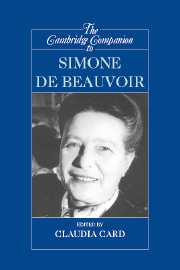Book contents
- Frontmatter
- Introduction: Beauvoir and the ambiguity of “ambiguity” in ethics
- 1 Beauvoir’s place in philosophical thought
- 2 Reading Simone de Beauvoir with Martin Heidegger
- 3 The body as instrument and as expression
- 4 Beauvoir and Merleau-Ponty on ambiguity
- 5 Bergson’s influence on Beauvoir’s philosophical methodology
- 6 Philosophy in Beauvoir’s fiction
- 7 Complicity and slavery in The Second Sex
- 8 Beauvoir on Sade: making sexuality into an ethic
- 9 Beauvoir and feminism: interview and reflections
- 10 Life-story in Beauvoir’s memoirs
- 11 Beauvoir on the ambiguity of evil
- 12 Simone de Beauvoir: (Re)counting the sexual difference
- 13 Beauvoir and biology: a second look
- 14 Beauvoir’s Old Age
- Bibliography
- Index
10 - Life-story in Beauvoir’s memoirs
Published online by Cambridge University Press: 28 May 2006
- Frontmatter
- Introduction: Beauvoir and the ambiguity of “ambiguity” in ethics
- 1 Beauvoir’s place in philosophical thought
- 2 Reading Simone de Beauvoir with Martin Heidegger
- 3 The body as instrument and as expression
- 4 Beauvoir and Merleau-Ponty on ambiguity
- 5 Bergson’s influence on Beauvoir’s philosophical methodology
- 6 Philosophy in Beauvoir’s fiction
- 7 Complicity and slavery in The Second Sex
- 8 Beauvoir on Sade: making sexuality into an ethic
- 9 Beauvoir and feminism: interview and reflections
- 10 Life-story in Beauvoir’s memoirs
- 11 Beauvoir on the ambiguity of evil
- 12 Simone de Beauvoir: (Re)counting the sexual difference
- 13 Beauvoir and biology: a second look
- 14 Beauvoir’s Old Age
- Bibliography
- Index
Summary
A life is such a strange object, at one moment translucent, at another utterly opaque, an object I make with my own hands, an object imposed on me, an object for which the world provides the raw material and then steals it from me again, pulverized by events, scattered, broken, scored yet retaining its unity; how heavy it is and how inconsistent: this contradiction breeds many misunderstandings.
THE MAKING OF A LIFE-STORY
In the Interlude that comes between parts I and II of Force of Circumstance, Simone de Beauvoir's third autobiographical volume, she reflects on what a peculiar object a life is. The peculiarity accrues when it is viewed not so much as a thing lived, but rather as an object of ongoing written representation – an object amenable to that double publicity entailed by the telling of one's own life-story in a published memoir. For the author, some of this peculiarity must inevitably be reflected back onto the life lived, because as the project of writing a memoir gets under way and life infuses the page, so will the prospect of the written record begin to infuse the experience of living. Certain experiences will take on the aspect of a theme, certain events the significance of an aberration, a confirmation of a pattern, a turning point, a nemesis, and so on, even while they are being spontaneously lived. We know that even as a little girl, if out of sheer romanticism, Beauvoir thought of her life as a “lovely story” in the making.
- Type
- Chapter
- Information
- The Cambridge Companion to Simone de Beauvoir , pp. 208 - 227Publisher: Cambridge University PressPrint publication year: 2003
- 2
- Cited by

